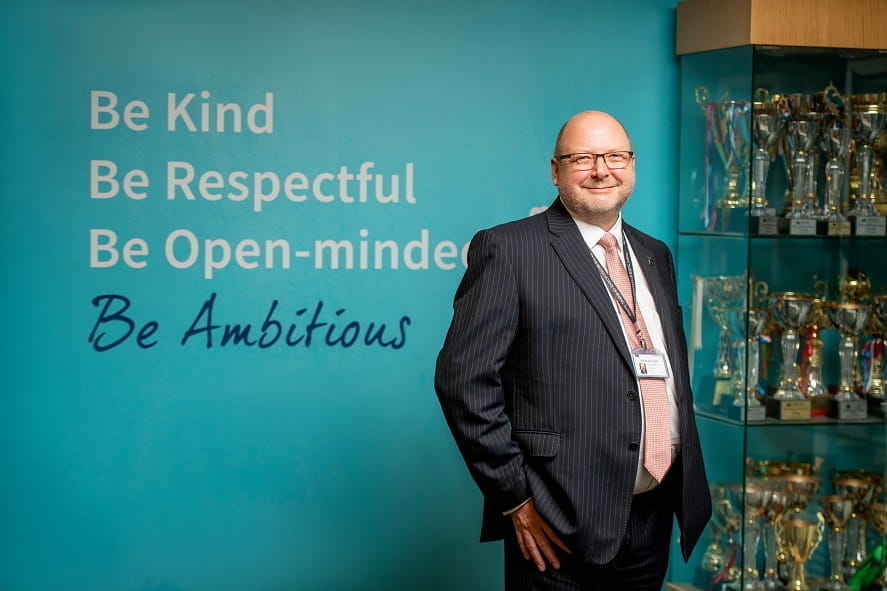We use cookies to improve your online experiences. To learn more and choose your cookies options, please refer to our cookie policy.

By John Brett, Principal of the British School of Beijing, Sanlitun
During the recent Christmas holiday, I learned that I am going to become a grandfather for the first time very soon. Let joy be unconfined! During our family’s many subsequent Facetime conversations we have discussed what kind of school we – as parents and grandparents – should be looking for when Jellybean (as the poor thing has been labelled by the parents) is a fully formed, shiny adolescent. I humbly offered a few thoughts of my own, which I share with you now by way of six must-have features of the school that my grandchild eventually attends!
“Now, what I want is facts. Teach these boys and girls nothing but facts. Facts alone are wanted in life.” So said Thomas Gradgrind, the notorious school board Superintendent in Charles Dickens’ Hard Times set in the 19th century. One legacy from that period that has blighted education ever since has been the insistence that children are taught what to think, rather than how to think. Too often, schools have paid lip service to the grand ideal of teaching ‘thinking skills’ only for these good intentions to wither in the face of content-driven curricula and exams.
Of course, thinking skills have traditionally been infused within the curriculum: logic in Maths and Latin or problem-solving in Science, for example. If one were to tease out such skills and teach them in a discrete way, one might end up with a different list of subjects, such as:
Learning strategies: revision, memory, organisational skills, time management.
Thinking skills: sorting, analysing, evaluating, brainstorming, critical thinking.
Personal skills: presentation skills, collaborative skills, personal welfare.
Given the ever-changing nature of the world of work into which children will emerge in twenty or so years’ time, the ability to think clearly and critically will surely be an essential skill.
There will always be tension in schools between children learning how to ‘follow the rules’ without reducing their scope for creativity. The very best schools know and recognise this and will work to create an environment where they can give students full scope for the imagination and originality that is in them; where physical, intellectual and philosophical risk-taking are positively encouraged.
The very best schools are places where consideration for other people, respect for their property, respect for their views, kindness towards them, and good manners flourish.
Tomorrow’s leaders will need to be imaginative, brave, compassionate, empathetic and determined. Look for evidence that the school is doing all it can to ensure that the seeds of those qualities are planted in the students from an early age and that those green shoots are allowed to germinate.
Make sure the school you choose is one where the relationship between home and school is seen as a positive and essential partnership to be nurtured, not a necessary evil to be endured! How does the school communicate with parents? How easy is it to see a teacher or member of the school leadership team if you have a concern? Does the school produce a regular newsletter? Is there a Parents’ Association and, if so, what is their function?
Close links between school and home are a strong indicator that the school is well and confidently led.
The world of work into which our children – or grandchildren – will emerge, is changing faster than at any time in our history. Equipping students with transferable skills, particularly life-long learning habits and an ability to work collaboratively, will be critical to their future prosperity.
Schools investing in teachers who are the most adept technologically, flexible in their working regimes, and, above all, sensitive to the changing demands placed on families and their children, will surely have the greater chance of achieving the best possible sustainable outcomes for their students.
New and emerging technologies can now place the learner at the centre of the teaching and learning process, which the teacher has hitherto occupied. Technology can enable schools to become true centres of learning that provide access and support beyond the conventional school day and to a far wider community than ever before.
There’s no doubt that global citizenship education in any form, particularly when involving students’ participation in projects that address global issues of a social, political, economic, or environmental nature, results in a more globally oriented and collaborative approach to education.
Promoting a culture of enquiry and discovery about the world around us and the interconnectedness of life on Earth has come out of the cold and is now a central tenet of education.
My final word of advice to all the Jellybeans out there would be to read books, play outside, watch the news, ask lots of questions, make mistakes, invent something, learn to swim, make a new friend, sleep in a tent, run until you’ve got a stitch – then keep running, try new food, have an argument, make a cake, write a song, have an adventure, stare at the moon and wonder what’s beyond it… do all these things and more, and you will soon begin to understand how the world works and your place in it.
Well that’s a Grandpa’s view, anyway.
John Brett is Principal of The British School of Beijing, Sanlitun. He has been Principal at the school for four years and was previously head of three independent prep schools in the UK spanning twenty years.
To learn how BSB Sanlitun embodies these six values, visit them online here.